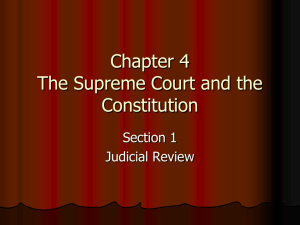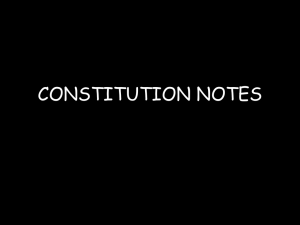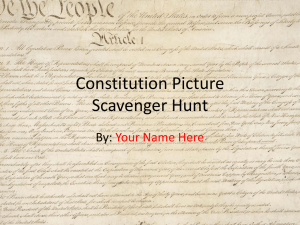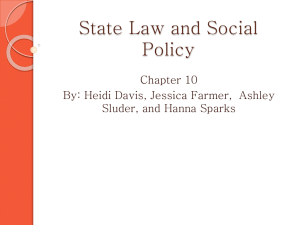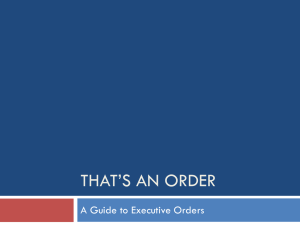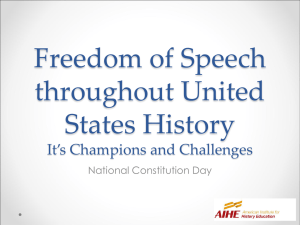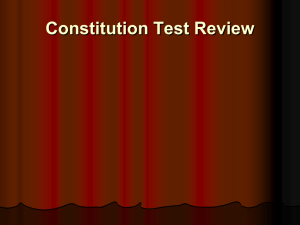Article I: The Legislative Branch
advertisement
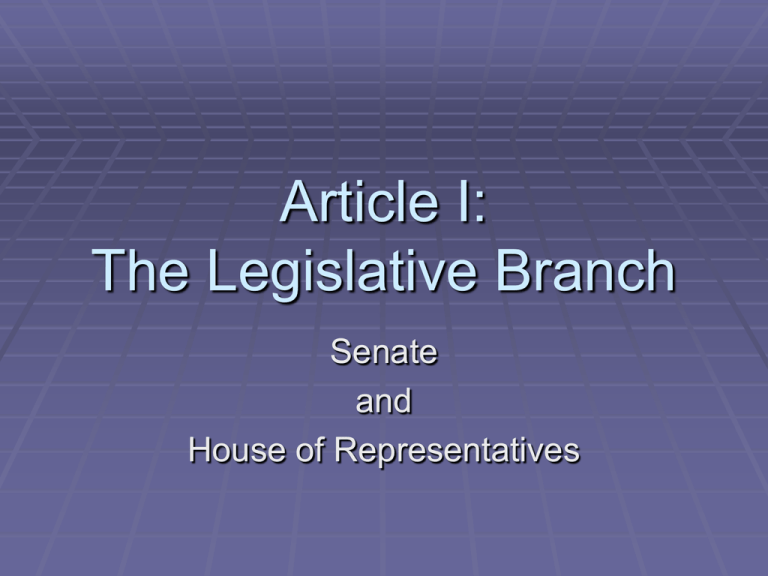
Article I: The Legislative Branch Senate and House of Representatives Legislative Powers Congress makes laws Borrows money Regulates trade Establishes rules for citizenship Coins money Punishes counterfeiting Gives copyrights and patents Establish post offices Establish federal courts Punish pirates Declare war Raise and support army and navy Rule Washington, D.C. Elastic clause! Preamble = Introduction We the People of the United States, in Order to form a more perfect Union, establish Justice, insure domestic Tranquility, provide for the common defence, promote the general Welfare, and secure the Blessings of Liberty to ourselves and our Posterity, do ordain and establish this Constitution for the United States of America. Checks and balances House impeaches (accuses) office holders Senate tries impeachments Congress can override (pass a law anyway) a president’s veto of laws. Power to the People Age limits on Senators (30) and Representatives (25) Equal opportunities for famous and unknown Pay for Senators and Representatives Don’t need to be rich to serve Census Maintains fair representation as population changes Elements that strengthen federal power Article I.18: “Congress shall have the power…to make all laws which shall be necessary and proper for carrying into execution the foregoing powers, and all other powers vested by this Constitution in the government of the United States.” Elements that strengthen federal power Article I.18 is called the Elastic Clause. Why? Elastic Clause: Constitution gives the national government the power to do anything “necessary and proper” to accomplish its tasks. Slavery Issues 3/5 Compromise Creates overrepresentation of slave state interests. Commerce Compromise No regulation of the slave trade for 20 years. How does a bill become a law? Listen to the song and write down the steps of the process you hear. How a Bill Becomes a Law 1) Begins as an idea. 2) Senators or representatives write them 3) The bill is sent to a committee. 4) The bill is presented to the committee’s house to vote on. 5) If the bill passes, it is sent to the other house. 6) The bill goes to the president who either signs it into law or vetoes it. 7) If the president vetoes the bill, Congress can override with a 2/3 majority. The Hopper Let’s make a law! In your committee, come up with a law you’d like to pass for our class and write it down. This is your bill. Present your bill to your house, and vote. If the bill passes, send it to the other house. Vote on the other house’s bills. Bills that pass both houses come to your president for possible veto. Article II: The Executive Branch The President “Carries out the laws” John F. Kennedy Our most basic common link is that we all inhabit this planet. We all breathe the same air. We all cherish our children's future. And we are all mortal. Executive Powers Oversees the federal Make treaties with government Issue executive orders Nominate judges to the Supreme Court Pardon(forgive) criminals who have broken federal law other countries Commander in chief of military forces Can create a cabinet to help assist them Can veto(reject) laws Current Cabinet http://en.wikipedia.org/wiki/Cabinet_of_the _United_States#Cabinet_and_Cabinetlevel_officials Qualifications President must be: Born in the United States At least 35 years old Lived in the U.S. for at least 14 years 22nd amendment limits President to 2 terms Limits on the Executive President can veto but Congress can override with a 2/3 majority vote Impeachment- bring charges against the president for treason, bribery, or other high crimes House of Reps has power to impeach Senate may hold a trial on accusations Impeachment of Bill Clinton Impeached by the House of Reps on perjury and obstruction of justice He was acquitted by the Senate because 2/3 majority did not find him guilty Electoral College Officially elects the President every 4 years Critics argue that a candidate can become President without securing the largest percentage of popular votes. Article III: The Judicial Branch The Supreme Court “Reviews the laws” Today’s Objective How did the expansion of the Judicial branch of the U.S. Government have a major effect on the country? Judiciary Powers Supreme Court has Marbury v. Madison authority to hear (1803) stated that the cases that arise under Court had the power the Constitution, of judicial review federal laws, and Judicial review was treaties the power to declare Can hear cases in laws that Congress which there is a passed to be dispute among the unconstitutional states Limits on the Judicial Branch Courts can only Judges are appointed decide cases that come before them Judges have no power to act on their own “Shall hold their offices during good behavior” for life but can be impeached by the Senate Congress can amend the Constitution to overturn a Supreme Court decision Dred Scott v. Sandford Dred Scott v. Sandford (1857) stated that slaves were property and not citizens 14th amendment (1868) overruled that decision and gave equal protection under the law Onondaga Nation Land Claim 1. What is the Onondaga Nation claiming that New York State did? 2. What exactly is a “land claim”? 3. How did the Supreme Court rule? What was one effect of this ruling? 4. Do you agree with the Supreme Court’s decision? 5. If the Supreme Court ruled in favor of Onondaga Nation, what would most likely be the result? You can be a justice…right now! No age requirements on becoming a Supreme Court Justice Apply today to become a justice…serve for life! Or you can work a few years… Tinker vs. Des Moines 1. Why were the students wearing “black armbands”? 2. What was the decision in the local courts? 3. How did the Supreme Court rule? 4. What did the Iowa school violate? 5. What power did this Supreme Court case give to individual schools? Article IV: The States States can’t discriminate against citizens of other states, must treat equally Ex. Two people commit a crime in Utah Congress can admit new states to the Union Article V: Amendments Thousands of amendments have been suggested. Congress has only proposed 33 amendments. (Needs 2/3 in both houses) Only 27 amendments have been ratified by the states (3/4 of state legislatures) Article VI: Supremacy Establishes the Constitution as the “Supreme Law of the Land” The Bill of Rights The First 10 Amendments to the Constitution 1st Amendment • The 1st Amendment guarantees freedom of religion, speech, the press, assembly, and petition. • • • • • • This means that we all have the right to: practice any religion we want to to speak freely to assemble (meet) to address the government (petition) to publish newspapers, TV, radio, Internet (press) QuickTime™ and a TIFF (Uncompressed) decompressor are needed to see this picture. 2nd Amendment • The 2nd Amendment protects the right to bear arms, which means the right to own a gun. 3rd Amendment • The 3rd Amendment says “No soldier shall, in time of peace be quartered in any house, without the consent of the owner, nor in time of war, but in a manner to be prescribed by law.” • This means that we cannot be forced to house or quarter soldiers. 4th Amendment • The 4th Amendment protects the people from unreasonable searches and seizures. • This means that the police must have a warrant to enter our homes. It also means the government cannot take our property, papers, or us, without a valid warrant based on probable cause (good reason). 5th Amendment • The 5th Amendment protects people from being held for committing a crime unless they are properly indicted, (accused) • You may not be tried twice for the same crime (double jeopardy) • You don’t have to testify against yourself in court. (Self-incrimination) 6th Amendment • The 6th Amendment guarantees a speedy trial (you can’t be kept in jail for over a year without a trial) • an impartial jury (doesn’t already think you are guilty) • that the accused can confront witnesses against them • the accused must be allowed to have a lawyer 7th Amendment • The 7th Amendment guarantees the right to a speedy civil trial. • A civil trial differs from a criminal trial. A civil trial is when someone sues someone else. A criminal trial is when the state tries to convict someone of a crime. 8th Amendment • The 8th Amendment guarantees that punishments will be fair and not cruel, and that extraordinarily large fines will not be set. 9th Amendment • All rights not stated in the Constitution and not forbidden by the Constitution belong to the people. • This means that the states can do what they want if the Constitution does not forbid it. 10th Amendment • The 10th Amendment states that any power not granted to the federal government belongs to the states or to the people.

